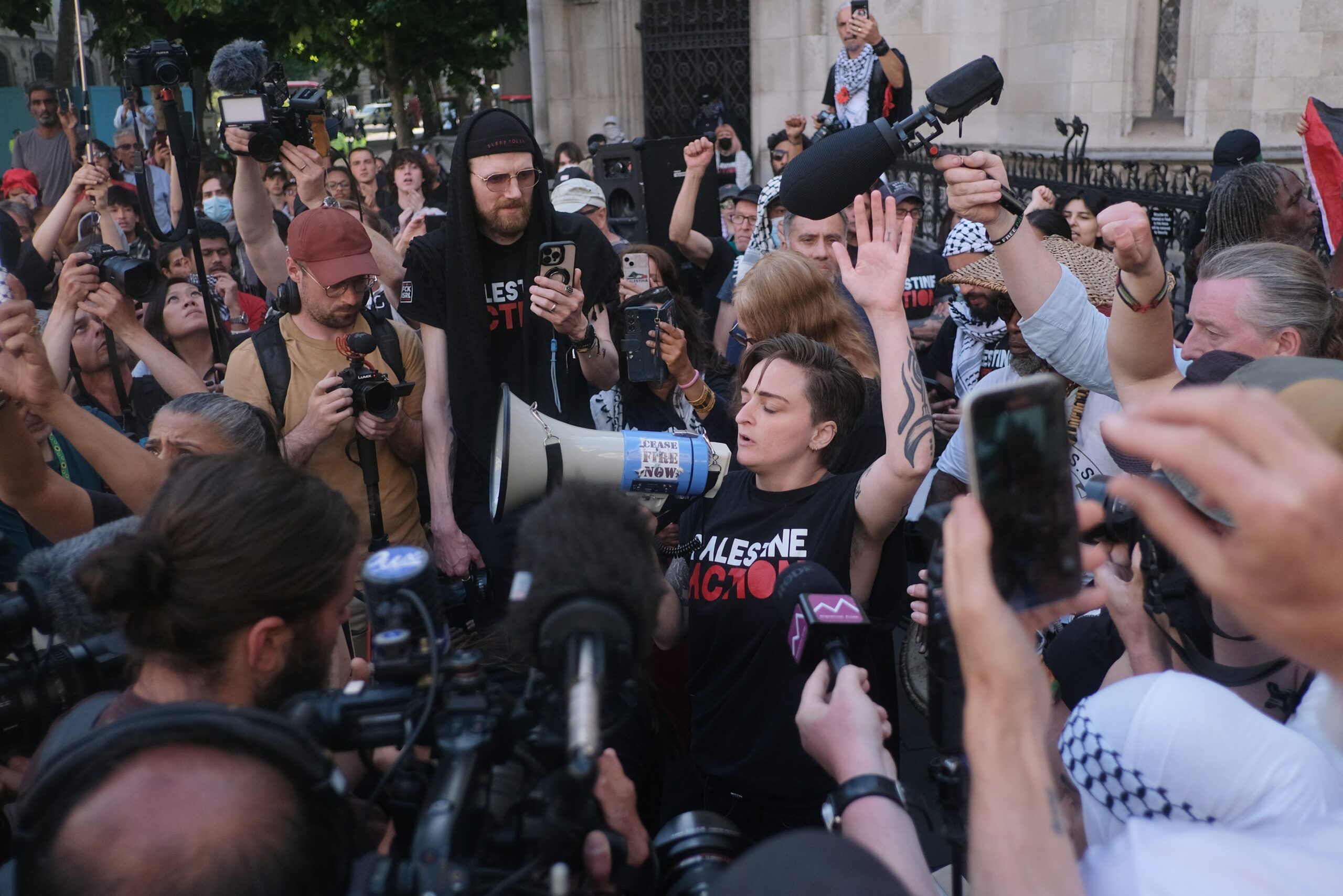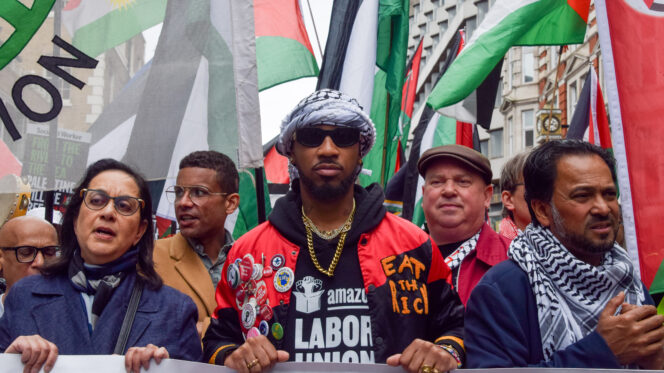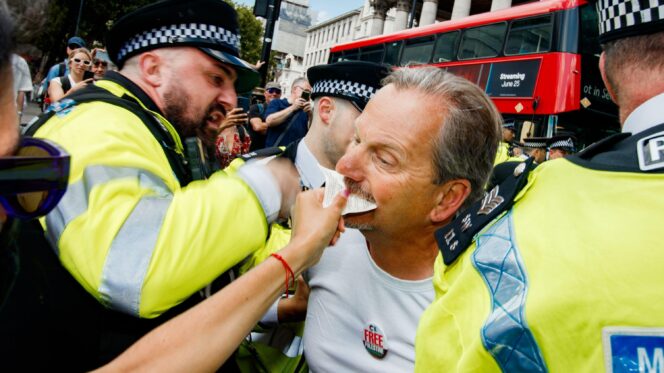Government Fails to Answer Novara Media’s Questions on Palestine Action Ban
We’re in the dark.
by Rivkah Brown
1 September 2025

The government has declined to answer all but one of Novara Media’s questions about how the proscription of Palestine Action will affect UK media outlets, leaving British journalists in the dark about how to conduct their work in an increasingly stifling environment.
The day before the proscription of Palestine Action (PA) came into effect on 5 July, the directors of Novara Media wrote to the attorney general’s office (AGO) with a list of questions about how the change would affect journalistic coverage of PA, arguably the most controversial addition to the UK’s list of proscribed terrorist groups. The AGO passed on the letter to the Home Office, which responded on 11 August.
Addressing virtually none of Novara Media’s questions, the Home Office instead offered a long defence of the government’s decision to proscribe the pro-Palestine direct action group. The letter also acknowledged that PA’s actions may not actually meet the legal definition of terrorism.
“It’s taken nearly six weeks for the Home Office to send us a letter that answers none of our questions, and contains virtually nothing of any informational value,” said Novara Media in a statement.
“What we wanted to know, both for Novara Media’s benefit and for the UK media industry as a whole, was whether ordinary journalistic practices could fall foul of the Terrorism Act. What the Home Office has said is that it’s up to the police to decide.”
“Maybe the home secretary herself has no idea how proscription law ought to apply to journalistic activities – or perhaps she thinks that keeping journalists in a state of deliberate ambiguity regarding the legal status of their work is useful for the government’s political aims.”
Novara Media put several questions to the government, including:
- whether content expressing support for Palestine Action published prior to proscription could remain available online, or should be removed;
- whether a member of the public re-sharing such pre-proscription content would be criminally liable, or would render the media outlet whose content they shared criminally liable;
- whether parliamentary privilege would protect MPs who wished to express support for Palestine Action, and whether media outlets could cover them doing so; whether media outlets could continue to cover any actions taken by Palestine Action, its members and supporters;
- whether media outlets could publish content criticising the decision to proscribe Palestine Action.
Of these questions, the Home Office answered only one: “It is not an offence to simply criticise the Government’s decision to proscribe Palestine Action.” The government also reminded Novara Media that “there is no absolute defence of journalism under CT [counter-terrorism] legislation.”
The Home Office also underscored that it could not offer legal advice to companies or members of the public – despite the fact that Novara Media’s original letter was addressed to the attorney general, the government’s most senior legal advisor.
Much of the rest of the Home Office letter is given over to a lengthy justification for proscribing PA. The letter condemns PA’s “nationwide campaign of direct criminal action”, which it says “has increased in frequency and severity” since the group’s founding in 2020. “[PA’s] methods have become more aggressive,” the letter states, “with its members demonstrating a willingness to use violence against individuals” (only one member of Palestine Action, Samuel Corner, has been charged with harming an individual. He is currently awaiting trial, and denies the charges).
“The seriousness of these attacks includes the extent and nature of damage caused, which runs into the millions of pounds, and the impact on innocent members of the public fleeing for safety,” the letter adds.
Citing the government’s “robust evidence-based process” for proscription, the letter says that “Palestine Action’s activities meet the threshold set out in the statutory tests established under the Terrorism Act 2000 and parliament has approved an order proscribing the organisation.”
The letter concludes: “At a time when we have seen intolerable scenes of suffering in Gaza, the government has been clear: lawful protest is a vital part of the UK’s vibrant democratic society. It is a long-standing tradition in this country that people are free to gather and demonstrate their views, provided they do so within the law. Palestine Action’s activities do not amount to peaceful protest.”
Tayab Ali, director of the International Centre of Justice for Palestinians, told Novara Media: “Even journalists attempting to report on [Palestine Action] … risk being accused of criminality simply for doing their job.”
The Home Office’s letter reflects brewing insecurity over whether PA’s actions amount to terrorism. It describes Palestine Action’s spray-painting of two RAF planes in June as “disgraceful” but appears to admit that it may not be a terrorist act, saying: “Regardless of whether this incident is ultimately determined to be ‘terrorism’, the UK’s defence enterprise is vital to the nation’s security and this government will not tolerate those that put that security at risk.” Five people have so far been charged in relation to PA’s spray-painting action at the RAF’s Brize Norton base, for a mixture of terrorism and non-terrorism offences.
The government’s decision to proscribe Palestine Action has been widely challenged, not only by international authorities, human rights defenders, global academics, leftwing novelists, hundreds of members of the public and some of the Labour party’s own leftwing MPs, but also by members of the political establishment.
Select rightwing media outlets have criticised the government’s decision, including the Murdoch-owned Times newspaper: “Palestine Action’s members may be misguided,” it said in an editorial, “but Britain must remain a country in which the right to express unpopular and dissenting political views is not subject to outright prohibition.” In late August, former director of public prosecutions Lord Ken Macdonald told the BBC that the decision to proscribe PA was “dangerous” and “should have been avoided”. The Liberal Democrats have called on the government’s independent terrorism legislation reviewer to assess the decision to proscribe PA.
Such consternation apparently extends to within the government itself. In July, Declassified revealed internal government documents that appeared to show reluctance to proscribe PA among the government’s own counter-terror committees.
“There [is] no known precedent of an organisation being proscribed… mainly due to its use or threat of action involving serious damage to property,” concluded the proscription review group. Meanwhile, MI5’s joint terrorism analysis centre found that “the majority of direct action by Palestine Action would not be classified as terrorism … but does often involve criminality”.
The government may be conscious that PA’s proscription is by no means a done deal. While only four groups have ever been removed from the UK’s list of proscribed organisations, there is a growing possibility that PA may be next.
In late July, the high court granted Huda Ammori, the co-founder of Palestine Action, permission to challenge PA’s proscription, which the judge said arguably “amounts to a disproportionate interference with the Article 10 and 11 rights of the claimant and others” – referring to the rights enshrined within the European Convention on Human Rights to freedom of expression and freedom of association, respectively. Campaign group Defend Our Juries has held several protests protesting the government’s proscription decision – the next will take place on Saturday 6 September, starting at 1pm in Parliament Square.
“This letter makes clear just how unworkable and damaging the government’s proscription regime has become. … The chilling effect on free expression and democratic protest is obvious,” Ali told Novara Media.
He added: “Proscription is meant to target genuine threats to public safety, not silence political dissent or obstruct legitimate reporting. What we are seeing is a dangerous misuse of counter-terror laws to suppress criticism of government policy and to stifle movements for justice that the home secretary doesn’t agree with.”
On Monday, the Metropolitan Police announced it had charged a further 47 people with terrorism offences related to expressing support for Palestine Action in July and August, bringing the total number of people charged with supporting PA to 114, a small fraction of the roughly 700 who have been arrested. Those convicted face up to six months in prison, as well as lifelong consequences for their professional lives and freedom of movement.
The same day, former Scottish first minister Humza Yousaf wrote to Scotland’s most senior prosecutor to say that Palestine Action supporters should not be criminalised, saying that doing so “risks misusing counter-terror powers against people of conscience”.
Rivkah Brown is a Novara Media commissioning editor and reporter.


